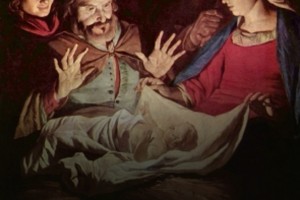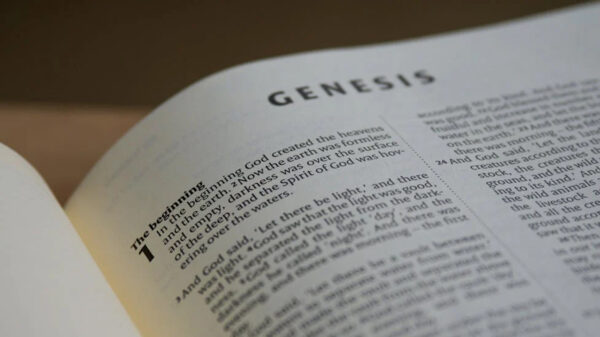
The Mythologies Aren’t That Similar
First and foremost, the pre-existing mythologies described by critics are not as similar to the “virgin conception” of Jesus as they would like people to believe. As an example, neither Mithras nor Horus was the product of a “virgin conception”. Mithras emerged from rock and Horus was conceived through a sex act between Isis and Osiris. While it is true that many pagan mythologies describe the gods having sex with mortal women, the blatant sexual activity of these mythologies is missing from the Biblical narrative.
Isaiah Wasn’t That Specific
Some have argued that paganism may have influenced Judaism first and corrupted the writers of the Old Testament prior to its transferred influence on New Testament writers, but this theory is also deficient. If Isaiah was borrowing the idea of a virgin conception from pagan sources, wouldn’t he have used more explicit language to describe the mother of God as a virgin? Isaiah uses the Hebrew word, “almah” in describing the mother of the messiah. This word means literally “young woman”. As a result, many Jewish apologists have historically argued that Isaiah was not describing a virgin at all, but was only referring to a young woman. While Matthew interprets Isaiah as describing a virgin, it is reasonable to assume that Isaiah would have been more explicit if he was trying to express an idea borrowed from paganism.
The Jews Weren’t That Accommodating
It’s unreasonable to presume that Greek, Babylonian, Egyptian or other pagan mythologies related to the birth of God would be embraced as part of a narrative targeted at Jewish believers. The Gospel writers were clearly trying to convince their Jewish readers that Jesus fulfilled the Old Testament prophecies related to the Messiah; it is irrational to believe that these Jewish readers would embrace any part of paganism in the story of Jesus’ conception as being continuous with the Jewish narrative from the Old Testament.
New Christians Weren’t That Accepting
Early Christian converts were called to a new life in Christ and repeatedly told that they were merely travelers passing through this mortal (and pagan) world. They were called to live a life that was free of worldly influences and told to reject the foolish philosophies and stories of men. This group, in particular, would be the last to return to pre-existing pagan stories and superstitions; we would expect the early Christians to be vigilant in protecting the Biblical narrative from the insertion of paganism given the repeated admonitions of the New Testament writers.
The Narrative Wasn’t That Late
The insertion of false pagan mythology into the birth narratives assumes the late writing of the Gospels. If the Gospels were written early (as the evidence confirms), the earliest eyewitnesses would have been available to challenge the false insertion of the supposed “virgin conception” narrative. Jesus’ own relatives would have been among the first century “fact checkers” who would have exposed this narrative as mythology.
The Borrowing Wasn’t That Directional
Even the weak resemblances between the Biblical account and pagan mythologies may be the result of Judeo Christian influence rather than contamination from a pagan source. Justin Martyr recognized this in the second century. In “The First Apology of Justin”, he argued that the surrounding pagans adopted elements of Judaism into their own religious beliefs.
The Similarities Aren’t That Surprising
Finally, the fact that some pagan mythologies describe gods who were born through some supernatural manner really shouldn’t surprise us. As early men and women began to think and dream about God, it was reasonable that they would imagine that an incredibly powerful, supernatural being would emerge into the natural world in some unexpected, supernatural way. For this reason, we would expect pre-Christian mythologies to bear some resemblance to the truth of the Christian narrative. This resemblance does not, in and of itself, invalidate the “virgin conception”.
There are several problems with the notion that the virgin conception was borrowed from prior pagan mythologies. While skeptics may reject the notion of the virgin conception for other reasons, they cannot reasonably claim it was borrowed from pagan mythologies.

J. Warner Wallace is a Dateline featured Cold-Case Detective, Senior Fellow at the Colson Center for Christian Worldview, Adj. Professor of Christian Apologetics at Talbot School of Theology, Biola University, author of Cold-Case Christianity, God’s Crime Scene, and Forensic Faith, and creator of the Case Makers Academy for kids.
Subscribe to J. Warner’s Daily Email
J. Warner Wallace is a Dateline featured cold-case homicide detective, popular national speaker and best-selling author. He continues to consult on cold-case investigations while serving as a Senior Fellow at the Colson Center for Christian Worldview. He is also an Adj. Professor of Christian Apologetics at Talbot School of Theology, Biola University, and a faculty member at Summit Ministries. He holds a BA in Design (from CSULB), an MA in Architecture (from UCLA), and an MA in Theological Studies (from Gateway Seminary).









































Pingback: Was the Virgin Conception Borrowed from Prior Mythologies? « Ratio Christi- At The Ohio State University
Pingback: December 28, 2012 | Another Slow News Day
Pingback: Is Jesus Simply a Retelling of the Horus Myth? | Apologetics ForumApologetics Forum
Pingback: Is Jesus Simply a Retelling of the Horus Myth? | A disciple's study
Pingback: Is Jesus Simply a Retelling of the Horus Myth? | Cold Case Christianity
Pingback: How to Respond to Claims Jesus Is a “Copycat Savior” (Free Bible Insert) - Cross Examined - Christian Apologetic Ministry | Frank Turek | Christian Apologetics | Christian Apologetics Speakers
Pingback: How to Respond to Claims Jesus Is a “Copycat Savior” (Free Bible Insert) | Apologetics.com
Pingback: How to Respond to Claims Jesus Is a “Copycat Savior” (Free Bible Insert) | Apologetics ForumApologetics Forum
Pingback: How to Respond to Claims Jesus Is a “Copycat Savior” (Free Bible Insert) | New York Apologetics
Pingback: How to Respond to Claims that Jesus is a “Copycat Savior” | Anchor Apologetics – Engaging the Church and Culture with Answers from a Christian Worldview
Pingback: What Do We Mean When We Use the Term, “Virgin Conception”? | TLG Christian News
Pingback: Five Reasons You Can Trust the Story of Christmas Is True (Free Bible Insert)
Pingback: Is Jesus Simply a Retelling of the Horus Mythology? | Cold Case Christianity – Lamb's Harbinger
Pingback: Five Reasons You Can Trust the Story of Christmas Is True (Free Bible Insert) - Cross Examined - Christian Apologetic Ministry | Frank Turek | Christian Apologetics | Christian Apologetics Speakers
Pingback: Think Divinely – The Virgin Birth Problem
Pingback: Was the Virgin Conception of Jesus Borrowed from Prior Mythologies? - Nehemiah Reset